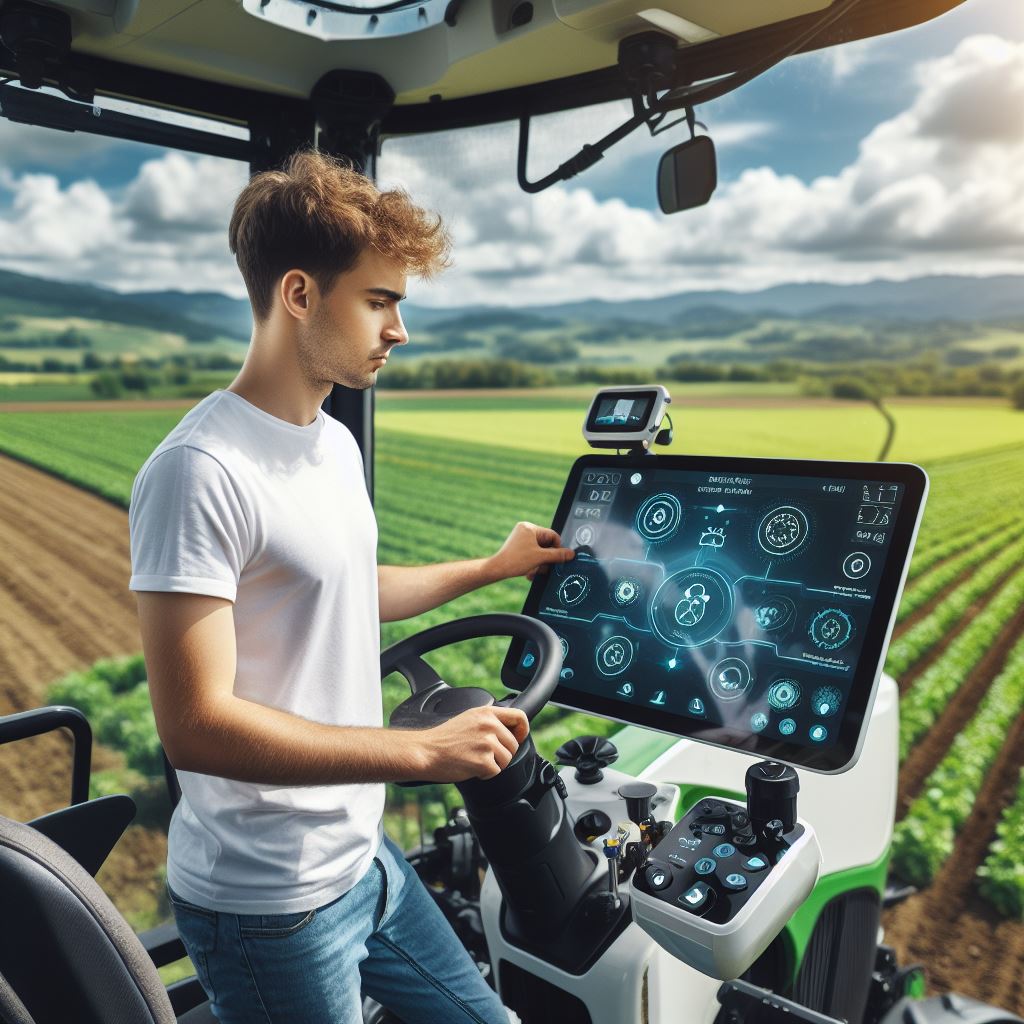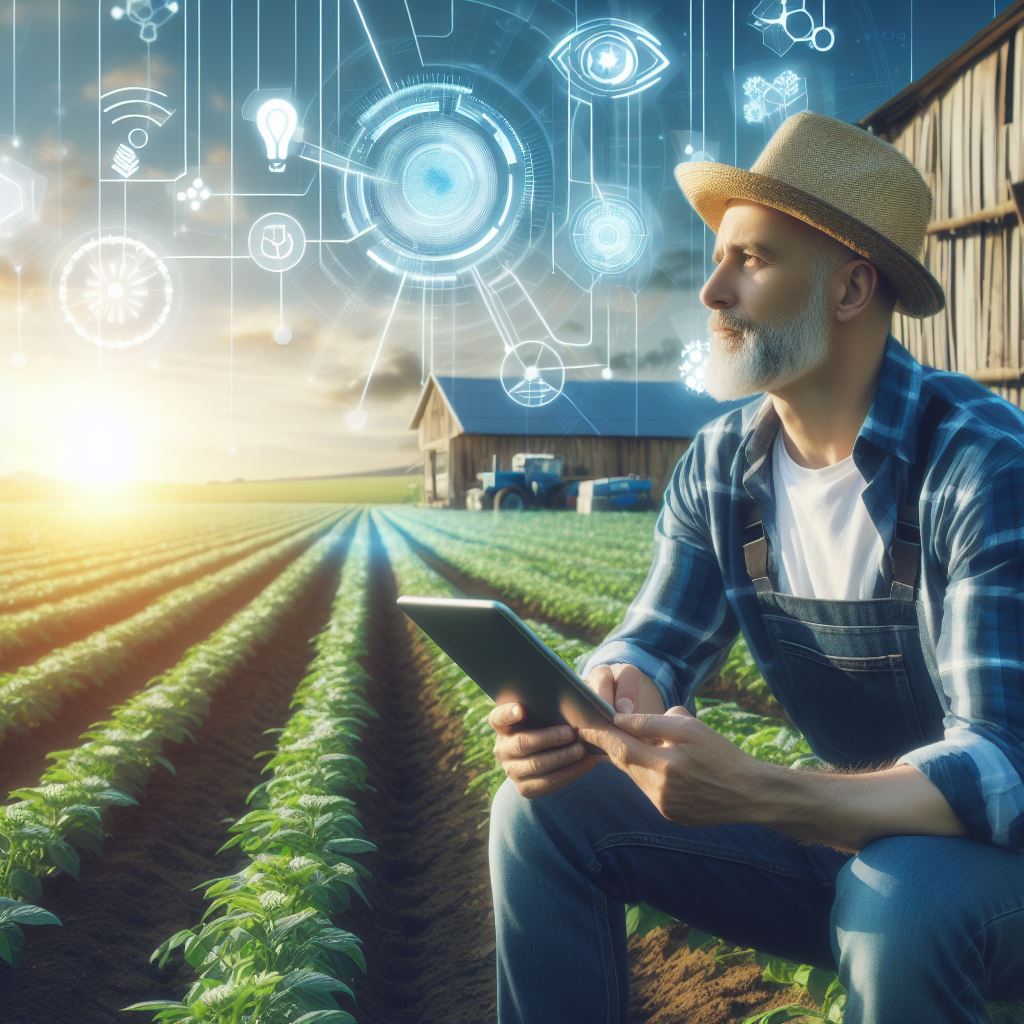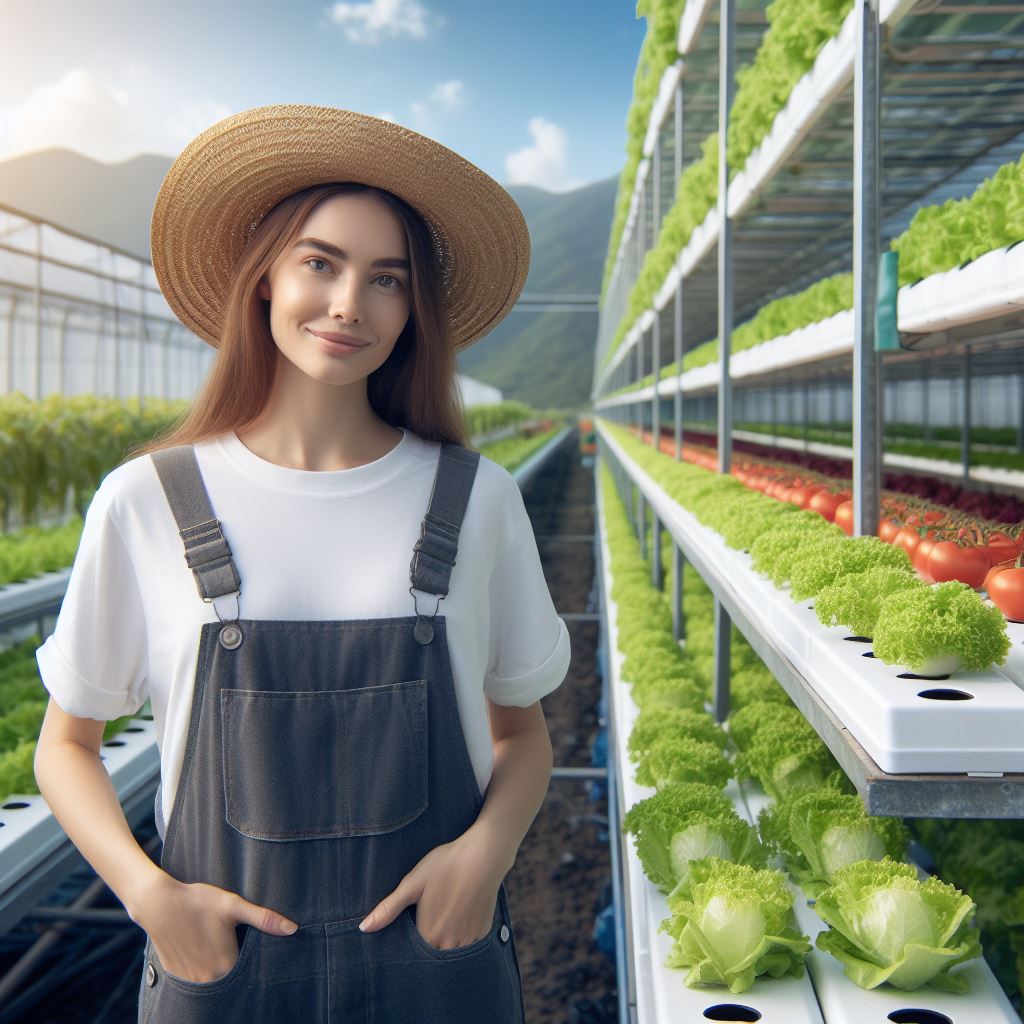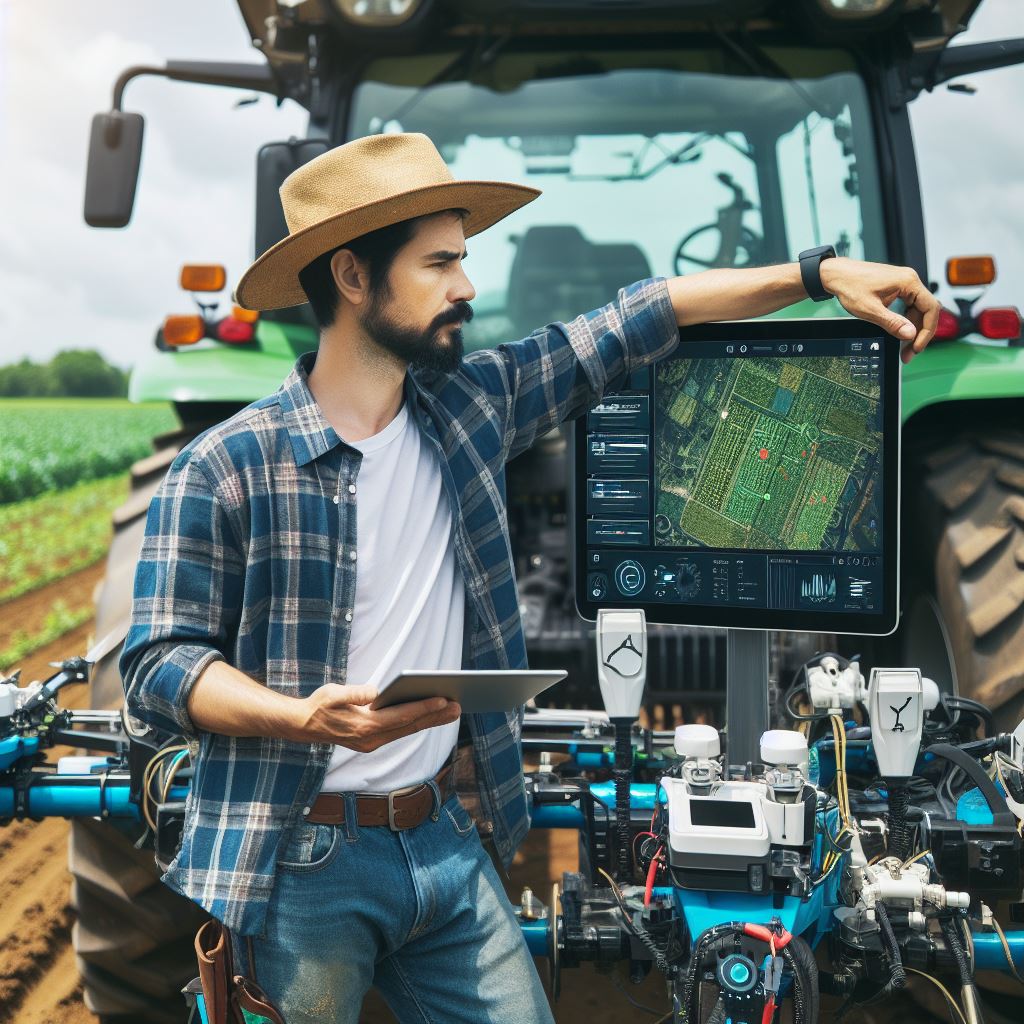Introduction
AI and Big Data are rapidly transforming the agriculture industry by improving efficiency and productivity.
AI refers to the ability of machines to perform tasks that would normally require human intelligence.
Big Data, on the other hand, is the collection and analysis of vast amounts of information.
These technologies have become increasingly important in farming as they provide valuable insights.
By harnessing AI and Big Data, farmers can make informed decisions about crop management and yield optimization.
They can analyze weather patterns, soil conditions, and crop health to enhance overall farm operations.
With the help of AI-powered sensors and drones, farmers can monitor their fields in real-time and detect any issues.
This allows for timely intervention and reduces the risk of crop failure.
Moreover, AI and Big Data can also assist in supply chain management and logistics.
By predicting market demand and optimizing transportation routes, farmers can minimize waste and reduce costs.
In short, AI and Big Data are revolutionizing the farming industry by streamlining processes, improving productivity, and ensuring sustainable practices.
How AI is transforming farming
AI is revolutionizing farming by improving crop management and precision agriculture, leading to numerous benefits.
With the help of AI, farmers can make data-driven decisions and optimize resource usage, ultimately increasing yield and profitability.
Here’s how AI is transforming farming:
Use of AI in Crop Management
- AI-powered drones and satellites collect real-time data on soil moisture levels, temperature, and nutrient content.
- Machine learning algorithms process this data to offer insights and recommendations for crop irrigation and fertilization.
- Farmers can monitor crop health and detect diseases or pests early, enabling targeted interventions and reducing losses.
Precision Agriculture
- AI enables farmers to create detailed field maps and analyze variations in soil composition and crop growth across different zones.
- By understanding these variations, farmers can apply fertilizers and pesticides more precisely, reducing waste and environmental impact.
- AI-powered robotics automate tasks such as seeding, weeding, and harvesting, increasing efficiency and reducing labor costs.
Benefits of Using AI in Farming
- Increased Efficiency: AI optimizes operations, resulting in better resource allocation, reduced waste, and improved productivity.
- Cost Reduction: AI helps minimize the need for manual labor, making farming more economical for farmers.
- Sustainability: By using AI to precisely manage inputs like water and chemicals, farming practices become more sustainable and environmentally friendly.
- Improved Decision Making: AI analyzes vast amounts of data, providing farmers with valuable insights for making informed decisions.
- Enhanced Yield: AI-driven technologies enable farmers to maximize crop yield through better pest management, irrigation, and nutrient application.
Examples of Successful AI Applications in Farming
- Disease Detection: AI algorithms can analyze images of plants to identify diseases or nutritional deficiencies, enabling timely intervention.
- Crop Monitoring: AI remotely monitors crop growth, predicts yield, and identifies anomalies that may indicate disease outbreaks.
- Predictive Analytics: AI models leverage historical data and weather patterns to predict crop yields, allowing farmers to plan better.
- Automated Harvesting: AI-powered robotics can efficiently harvest crops, reducing manual labor and addressing labor shortages.
- Livestock Management: AI helps monitor animal health, predict disease outbreaks, and optimize feeding schedules for improved animal welfare.
In a nutshell, AI’s impact on farming is significant and far-reaching.
Transform Your Agribusiness
Unlock your farm's potential with expert advice tailored to your needs. Get actionable steps that drive real results.
Get StartedBy using AI in crop management and precision agriculture, farmers can optimize resource usage, increase efficiency, and achieve sustainable practices.
Examples of successful AI applications in farming demonstrate its potential to revolutionize the industry and address the challenges faced by farmers today.
As AI continues to advance, it promises a future where agriculture is more productive, profitable, and environmentally conscious.
Read: Tech Trends: AI & Crop Management
The Role of Big Data in Farming
Big Data has the potential to revolutionize the agricultural industry in numerous ways.
By collecting and analyzing vast amounts of agricultural data, farmers can make more informed decisions and improve their overall productivity and efficiency.
In this section, we will explore the collection and analysis of agricultural data, the importance of data-driven decision making, and the challenges faced in managing and utilizing Big Data in farming.
Collection and Analysis of Agricultural Data
One of the key aspects of Big Data in farming is the collection and analysis of agricultural data.
This involves gathering information from various sources such as sensors, satellites, weather stations, and machinery.
The data collected can include weather patterns, soil compositions, crop yields, and market trends.
Through advanced analytics, farmers can gain valuable insights into their operations and identify patterns and correlations that might not be apparent through traditional methods.
Importance of Data-Driven Decision Making
Data-driven decision making is crucial for farmers as it allows them to make informed choices based on facts rather than intuition.
By analyzing agricultural data, farmers can optimize their processes, predict yields, and manage resources more effectively.
For example, they can determine the optimal time for planting, irrigation, and harvesting based on historical weather patterns and soil conditions.
This not only maximizes crop yield but also minimizes the use of resources such as water and fertilizers, making farming more sustainable.
Challenges in Managing and Utilizing Big Data in Farming
- While the benefits of Big Data in farming are immense, there are several challenges in managing and utilizing this data effectively.
- Firstly, the sheer volume of data generated can be overwhelming, making it difficult to store, process, and analyze.
- Additionally, data can be collected from multiple sources, each using different formats and protocols, making integration and standardization complex.
- Furthermore, the lack of data literacy among farmers and limited access to necessary technology can hinder the adoption of Big Data in farming.
- Many farmers lack the skills and knowledge required to collect, analyze, and interpret data effectively.
- Additionally, the cost of infrastructure like sensors and analytics software can pose a hurdle for small-scale farmers with limited resources.
- To overcome these challenges, collaboration between farmers, researchers, and technology providers is crucial.
- Governments, organizations, and companies must invest in user-friendly tools simplify data collection, analysis, and interpretation for farmers.
Big Data has the potential to transform farming by revolutionizing the way farmers collect, analyze, and utilize agricultural data.
By embracing data-driven decision making, farmers can optimize their processes, increase productivity, and reduce resource wastage.
However, challenges such as data management, integration, and lack of skills need to be addressed to fully realize the benefits of Big Data in farming.
Through collaboration and investment in technology and knowledge transfer, farming can enter a new era of productivity and sustainability.
Read: Next-Gen Farming: The Role of Drones

The Future of Farming with AI and Big Data
In recent years, advancements in AI and big data technologies have revolutionized various industries, and farming is no exception.
The integration of AI and big data has great potential to transform the agricultural sector for enhanced productivity, efficiency, and sustainability.
Here are some key aspects showcasing the future of farming with AI and big data:
Potential Advancements in AI and Big Data Technologies
- AI-powered drones can collect real-time data about crop health, moisture levels, and pest infestations.
- Machine learning algorithms can analyze vast amounts of agricultural data to provide actionable insights and predictions.
- Big data analytics can aid in understanding consumer preferences, market trends, and weather patterns.
- AI chatbots can assist farmers in making informed decisions regarding crop rotation, fertilization, and irrigation.
Integration of AI and Big Data in Farm Machinery and Equipment
- Smart tractors equipped with AI algorithms can optimize fuel consumption and reduce environmental impact.
- Sensors embedded in farming equipment can collect data on soil composition, temperature, and moisture.
- AI-powered sorting machines can classify harvested crops based on quality and automatically remove defective ones.
- Robotic systems can perform tedious tasks like weed removal, planting, and harvesting with high precision.
Impacts on Productivity, Efficiency, and Sustainability in Farming
- By leveraging AI and big data, farmers can make data-driven decisions that optimize resource allocation and increase productivity.
- Predictive analytics can help farmers identify potential crop diseases and take preventive measures, reducing crop loss.
- Optimized irrigation systems based on real-time data can minimize water wastage and promote sustainable water usage.
- AI-powered robots can reduce the dependency on manual labor, leading to increased efficiency in farm operations.
- By analyzing historical and real-time data, farmers can adopt precision farming techniques, minimizing fertilizer and pesticide use.
- AI and big data can enable predictive maintenance of farm machinery, reducing downtime and enhancing operational efficiency.
In summary, the future of farming holds immense potential with the integration of AI and big data technologies.
Showcase Your Farming Business
Publish your professional farming services profile on our blog for a one-time fee of $200 and reach a dedicated audience of farmers and agribusiness owners.
Publish Your ProfileThe advancements in these fields offer opportunities to overcome various challenges faced by the agricultural sector, leading to increased productivity, efficiency, and sustainability.
By leveraging real-time data, predictive analytics, and intelligent machinery, farmers can make informed decisions and optimize their farming practices.
The adoption of AI and big data in farming is crucial for meeting the growing global demand for food while minimizing the environmental impact.
Embracing these technologies will shape a more efficient and sustainable future for agriculture.
Read: Drone Imaging in Farms: A New Perspective
Barriers and challenges in adopting AI and Big Data in farming
Cost and accessibility of technology
One major obstacle for farmers is the expense of implementing AI and Big Data solutions on their farms.
The upfront costs of purchasing advanced technology can be prohibitive for many.
Additionally, in some rural areas, there may be limited access to reliable high-speed internet, which is crucial for utilizing AI and Big Data effectively.
To tackle the cost and accessibility challenges, governments and agricultural organizations should provide financial assistance and subsidies to farmers to help them invest in AI and Big Data technologies.
By making these technologies more affordable, farmers can overcome the financial barrier and gain access to the tools that can revolutionize their farming practices.
Privacy and data security concerns
As farmers adopt AI and Big Data, they must navigate the complex issue of privacy and data security.
Agricultural data collected through these technologies can be highly valuable and sensitive.
Farmers need assurance that their data will be protected from unauthorized access or misuse.
Strict security measures must be implemented to address these concerns and build trust among farmers.
In terms of privacy and data security concerns, industry associations and regulatory bodies should establish robust guidelines and best practices for data handling in agriculture.
Implementing encryption and secure data storage systems can safeguard farmers’ data and protect their privacy.
It is important to assure farmers that their data will only be used for their benefit and that proper consent will be obtained before sharing it with third parties.
Overcoming resistance to new technologies
- Traditionally, farming has been an industry deeply rooted in tradition, and many farmers are apprehensive about embracing new technologies.
- Overcoming resistance to change is a significant challenge in adopting AI and Big Data in farming.
- Proper education and demonstration of the benefits these technologies offer can help address this resistance.
- Organize educational programs to address technology resistance, raising awareness about AI and Big Data benefits in farming.
- Sharing success stories and case studies of how these technologies have improved yields and reduced costs can inspire other farmers to embrace them.
- Collaborating with early adopters and industry experts can also help dispel misconceptions and provide guidance on integrating AI and Big Data solutions effectively.
Ultimately, the adoption of AI and Big Data in farming has the potential to revolutionize the industry, leading to increased productivity, sustainable practices, and better resource management.
However, the barriers and challenges discussed above must be addressed for widespread adoption to occur.
By proactively addressing cost, accessibility, security, and resistance concerns, the farming community can unlock the full potential of AI and Big Data, ensuring a prosperous and sustainable future for the industry.
Read: Farming Apps: Top Picks for 2024
Conclusion
The importance of AI and Big Data in farming cannot be overstated.
These technologies offer a wide range of benefits and opportunities for the agricultural industry.
By harnessing the power of AI and Big Data, farmers can make more informed decisions, optimize their processes, and increase their productivity and profitability.
It allows for precise monitoring and management of crops, livestock, and resources.
Furthermore, embracing AI and Big Data can lead to improved sustainability and environmental stewardship.
By analyzing vast amounts of data, farmers can identify patterns and trends, enabling them to implement more efficient and sustainable practices.
The potential benefits of AI and Big Data in agriculture are immense.
Increased efficiency, higher crop yields, better resource management, and enhanced profitability are just a few examples of what these technologies can bring.
Farmers must embrace AI and Big Data in their practices.
By doing so, they can stay competitive and meet the growing demands of our global population.
In essence, AI and Big Data are shaping the future of farming.
The possibilities are endless, and the benefits for the agricultural industry are vast.
It is an exciting time for farmers to adopt these technologies and pave the way for a more sustainable and productive future.




